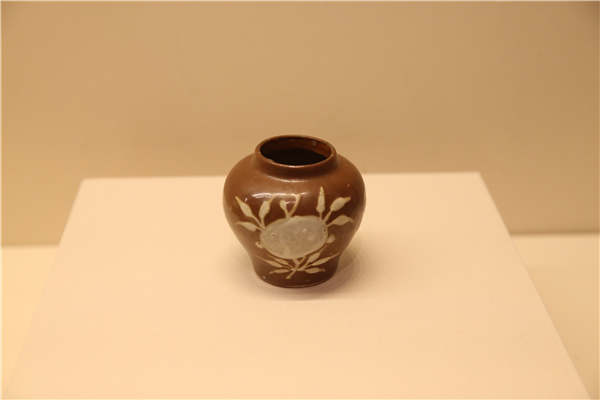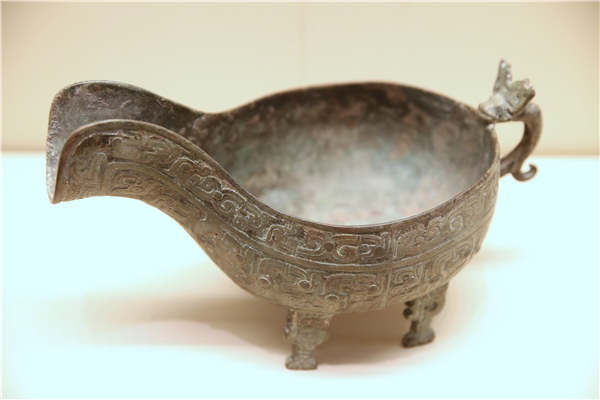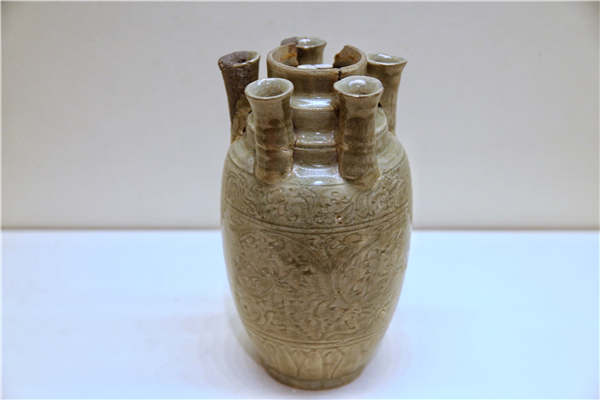Information
Cultural assets exhibition in Beijing
Late minister Zhang Naiqi's collection of antiquities are on display in Beijing. Lin Qi reports.
Historian Zhang Lifan recalls his childhood home in a siheyuan, the traditional quadrangle-style courtyard house of Beijing, being decorated with hardwood furniture made in the classical Chinese style and the many antiquities that his late father Zhang Naiqi, an economist and food minister, had collected over decades.
Zhang Lifan, 68, says he used to ask his father about where and when the objects came from.
He says one day his father showed him a bronze dagger that sparkled with rays and was patterned all over with grid motifs.
In a note on the dagger, Zhang Naiqi wrote, "A bronze sword from the Warring States Period (475-221 BC), sharp as a razor ... a rare example for the study of smelting and decorating technologies."
The sword was later among more than 1,000 antique objects in Zhang Naiqi's collection donated to State museums, including the Palace Museum and the National Museum of China.


Now a selection of 120 artifacts from that donation to the National Museum of China, including the sword, are up for public viewing at a permanent exhibition titled Affections Toward His Nation, which marks the 120th anniversary of Zhang Naiqi's birth.
Zhang Naiqi was known as an influential banker, and one of the seven leaders of a national salvation alliance who were arrested in 1936 by the Kuomintang-led government for criticizing its policy of nonresistance against Japanese aggression.
What is less known to people is that his interest in collecting antiquities had intensified over the years.
The exhibition shows a connoisseur whose collection hierarchy covers almost every category of Chinese artworks, and who believed his cultural assets should ultimately be shared with the public.
The objects on display include sophisticated bronze ware dating to the Shang (c. 16th century-11th century BC) and Zhou (c. 11th century-256 BC) dynasties, ceramics, bronze mirrors that feature beautiful carvings on the back and jade artifacts, the earliest of which can be traced back to Neolithic times.
Zhang Naiqi donated his collections twice to the Palace Museum in the 1950s and 1960s.
His family made a third donation to the National Museum of China in the 1980s.
Zhang Naiqi was a frequent customer at antique stores in the Longfu Temple and Liulichang areas in Beijing, and he was also a regular visitor to street vendors.
Zhang Lifan says his father told him that the streets of Beijing were awash with cultural objects, but the good and the bad, the real and the fake were all mixed together.


"He said because he was not a well-trained professional for authenticating cultural relics, he bought real and quality items, but sometimes he was cheated."
The way Zhang Naiqi became discerning was to learn from historians, scholars and senior collectors, such as Sun Yingzhou and Zhang Boju.
His exchanges with them in return helped enrich his collection.
He also befriended reliable antique dealers who would contact him when they found quality goods.
Zhang Lifan says his father ordered a lot of boxes to store the objects and together with them, he attached a note of the basic information, his views and sometimes the appraisal opinions of other collectors.
Zhang Naiqi once said: "These antiquities constitute an indispensable part of my spiritual life. They are the incarnations of Chinese art and culture. They are good teachers who help me improve cultural attainment."
Zhang Lifan says collecting is a process where people own something once, but not for ever.
"If you are lucky to have antique objects, you gain great pleasure in handling them, and that's all a collector can ask for."
If you go
9 am-5 pm, Mondays closed. 16 East Chang'an Avenue, Dongcheng district, Beijing. 010-6511-6400.
Category: English
News
Information
Key words:
